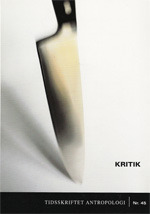METODE: AT VÆKKE UNDERSØGELSESOBJEKTERNES GENSTRIDIGHED: Om gæringsprocesser i interviewanalyse
DOI:
https://doi.org/10.7146/ta.v0i45.107382Resumé
To analyse and interpret qualitative data is
like putting a puzzle together. In this article it
is argued that the most valuable pieces often
are those which do not fit into the developing
pattern. They are the ones that force one to
widen or reconsider one’s hypothesis, and
thereby disclose new knowledge. In the first
part of the article, this idea is illustrated by
use of a report, based mainly on interviews,
on incentives and barriers to comply with
safety rules in Danish merchant ships.
The analysis of the interviews revealed
many inconsistencies and contradictions
between the answers and even within the
same interviews. This reflects ambivalence
or contrasting feelings or signals (e.g.
contradictory demands from shipowners
and authorities or ambivalence toward the
shipowner or the foreign crew members).
The second part is initiated by setting out the
strange feeling acquired in the course of the
analysis, that at one time the author stopped
mastering what was happening, as if the
statements began to interfere independently
of her own will. The author utilizes some of
the works of Bruno Latour to understand this
feeling. What she experienced, with Latour’s
words, was a transition from objectivity to
“objectory”. In other words the statements
the author was trying to analyse began to
“object” in an obstinate way. She learned
from Latour that she’d better encourage
them to do so, instead of trying to imitate an
alleged disinterested objective research.
Downloads
Publiceret
Citation/Eksport
Nummer
Sektion
Licens
Ophavsretten til artiklerne i Tidsskriftet Antropologi tilfalder forfatteren.
Artikler publiceret i Tidsskriftet Antropologi må citeres, downloades og videresendes for ikke-kommerciel brug, under forudsætning af normal akademisk reference til forfatter(e) samt tidsskrift, årgang, nummer og sider. Artiklerne må kun genudgives med eksplicit tilladelse fra forfatter(e) og tidsskriftet.


